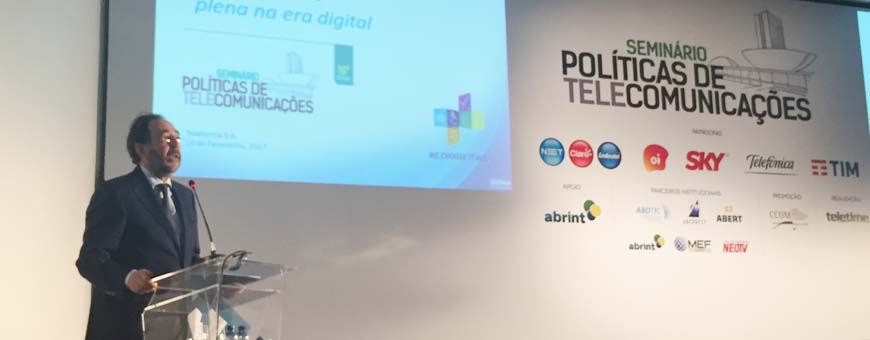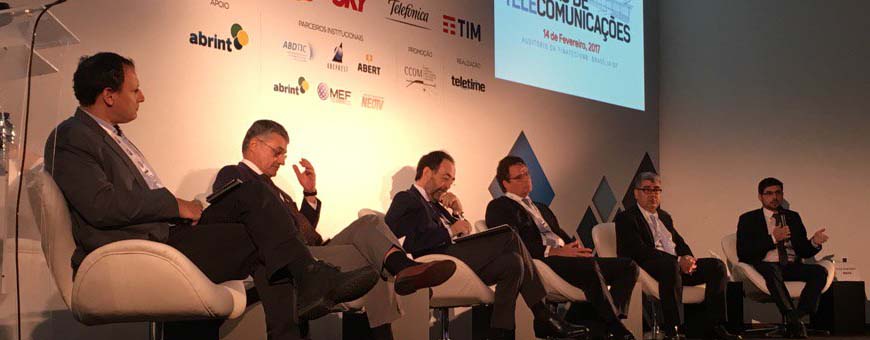 José Ignacio Tortosa
José Ignacio Tortosa

Carlos López Blanco, Telefónica’s Global Head of Public Affairs and Regulation, has participated this week in the “Policies for connecting all in our digital age” panel at the 16th edition of the Telecommunications Policies Seminar in Brasilia (Brazil). The seminar is Brazil’s main regulatory and political gathering of the sector.
During his intervention, he talked about the digital revolution we are living through and the next step, the digital economy. It is a real revolution, since the way we do things is different, and technology is not the main issue, but the way we fulfill customers´ demands. The Digital economy is a challenge for any business. The way new companies like WhatsApp, Airbnb, Netflix or PayPal are challenging traditional business models in the Telco, accommodation, entertainment or banking sectors is a clear signal.
In the future, rich countries will be the ones which better tackle the challenge of digitization. Currently, digitization index in Latam is superior to the average of digitization in the world, but far away from North-America or Europe.
However, Telefónica believes the Latam region is better prepared than any time before since they have best-in-class infrastructures and a young population with a big interest on entrepreneurship and on the use of new technologies. So there is the need to join these assets with the policies that can help to boost digitalization.
The executive stated the need to have in the region a comprehensive vision of all the public policies that can enable the productive transformation, social inclusion and the development of human capital. Useful policies to distribute wealth and boost the number of people connected, while preserving privacy and security, in a fair competitive and regulatory framework.
Since the Seminar was focused in telecommunications regulatory policies, he also gave his vision on the different regulatory approaches in the world. In the last 20 years, there have been regulatory frameworks that boosted infrastructures through private investments (USA), subsidized by the states (Asia) or in a private-public approach (Latam), while others, like Europe, have been focused on competition and prices.

After two decades of convergence/divergence on regulation/deregulation between Europe and USA, it is likely that for the first time since 2003, regulation in USA and in Europe, in 2017, can converge towards a framework that favors investments and deregulation.
Nowadays Europe is tackling its weakness in the digital ecosystem: a fragmented market, low growth perspective for Telco market, no relevant over-the-top internet companies and absence of global rules in privacy and weakness in cybersecurity.
In reply to all these challenges, Europe has developed the Digital Single Market (DSM) strategy, a priority for the European Commission. Under the DSM strategy, several initiatives are in course; like the Gigabit Society initiative, with demanding targets on deploying high capacity networks for 2020 and 2025. The new regulatory framework proposed follow 3 majors goals:
- Incentives to innovation and investments: Europe is aware of the need to encourage the deployment of new networks, and is trying to simplify regulation and adapt regulation to new markets.
- Level Playing Field: same services, same rules, same protection. To guarantee it, European regulatory framework redefines the concept of electronic communications.
- Harmonization and simplification of spectrum policy in Europe: there is a positive vision in the European countries for more harmonization.
Telefonica’s Public Affairs and Regulation Global Head ended his keynote highlighting the implications of these new environment for Latam and Brazil. Latam should not lose the path of the last twenty years on public policies and regulation, which have taken the region to have best in class Telecom infrastructures.
Latam and Brazil, should be prepared to boost the digitization with the appropriate public policies that favor investments, simplify and harmonize spectrum management, and also guarantee a level playing field for all competitors. Telefónica is going to be there to help in this positive and pro-development vision for the region.






